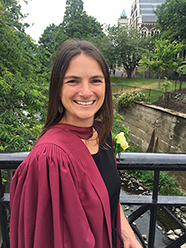Why did you decide to undertake postgraduate DClinDent studies?
After eight years of general dentistry I was keen to further my learning and develop my manual skills to become really good at one aspect of dentistry. I had been interested in endodontics since my undergraduate training, and had attended many courses and lectures while I was a general dentist. Endodontics is a challenging aspect of dentistry that requires attention to detail, problem-solving and patience. While not for everyone, this type of work suits me.
Were there specific reasons that you decided to do your postgraduate DClinDent studies at the Otago Faculty of Dentistry?
I preferred to stay in New Zealand, and as I had done my undergraduate training at Otago I was familiar with the Endodontic department. Dunedin is a great city to live in and we enjoyed returning for another three years.
What has your postgraduate journey been like so far?
A year before applying for the DClinDent course I took a postgraduate paper in Bioethics through Otago. I loved it and I realised that I wanted to pursue postgraduate studies in dentistry. It was quite an adjustment after many years of being in the workforce, and it was a decision that not only affected me but my partner and his work situation. I enjoyed the research component of this course far more than I anticipated, and found completing my thesis really satisfying. Taking on a long-term project like DClinDent-level research was challenging, and especially as I had become used to short-term goals in my work, such as completing treatment plans for patients. Postgraduate study required a whole new mind-set.
Has postgraduate study influenced your work, career, personal life?
Postgraduate study has enriched my working life: obviously I have a much deeper understanding of my field, which brings more satisfaction, but I also have the skills to critically evaluate others' research and draw my own conclusions. At the moment I work as a clinician, but I know in the future if I wanted to branch out into other non-clinical aspects of dentistry, my postgraduate training will provide more opportunities.
Has undertaking postgraduate DClinDent studies had an effect on your clinical practice?
I work solely as an Endodontic specialist, providing specialist treatment to patients. Focusing on one aspect of dentistry and offering an expert service to patients and colleagues is very satisfying.
Has undertaking postgraduate studies had an effect on how you view evidence for practice?
Postgraduate courses such as DClinDent help you develop skills to critically evaluate research. This is a key difference between undergraduate- and postgraduate-level training. Being a clinical specialist means that you are able to determine your own evidence-based guidelines to work by based on the academic literature.
Would you recommend postgraduate DClinDent studies to colleagues, friends, or peers?
I think a DClinDent course would really suit somebody who is keen to hone their manual skills, wants to find out more and enjoys discussion. It does lead to different clinical work: for example, you often don't have the same long-term patient relationships, as a lot of specialist work is contract-based.
What advice would you give to others about undertaking postgraduate studies in general and/or a paper in particular?
You need to be interested and self-motivated. Postgraduate study is about thinking for yourself and forging your own path. A large part of an Endodontist's job is diagnosis and pain management which are skills learned by experience, and so I would really recommend at least several years of general dentistry before returning to study.
How did you find interacting with the other students on the programme?
The numbers of students on these courses are small, but there are opportunities for group seminars and discussions. (I was studying during the build for the new school so I actually found that there wasn't a lot of opportunity for interaction – all the DClinDent students were spread out over the university and I ended up doing a lot of research work from home).
Further information
Doctor of Clinical Dentistry (DClinDent) in Endodontics
DClinDent graduate profiles

Dr Nina Scott.
